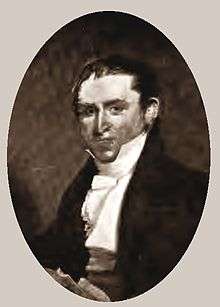John Lowell, Jr. (lawyer)

1769–1840
John Lowell, Jr. (October 6, 1769 Newburyport, Massachusetts – March 12, 1840 Boston) was an American lawyer and notable member of the Federalist Party in the early days of the United States of America.
Career
John Lowell, Jr., was the son of John Lowell (1743–1802). He graduated from Harvard in 1786, and was admitted to the bar in 1789 (like his father, before he was twenty years old). He retired from active practice in 1803, and traveled to Europe.[1]
After his return in 1806 he devoted himself to literature, writing on politics, agriculture, theology, and other topics, under various signatures, such as "Citizen of Massachusetts", "Massachusetts Lawyer", "Layman", and "Yankee Farmer".[1] He opposed French influence and the policies of the Democratic Party, writing many spirited pamphlets (some signed "The Boston Rebel", some "The Roxbury Farmer"), including: The Antigallican (1797), Remarks on the Hon. J. Q. Adams's Review of Mr Ames's Works (1809), New England Patriot, being a Candid Comparison of the Principles and Conduct of the Washington and Jefferson Administrations (1810), Appeals to the People on the Causes and Consequences of War with Great Britain (1811) and Mr Madison's War (1812). The pamphlets contain an extreme statement of the anti-war party and defend impressment as a right of long standing.[2]
After the war Lowell abandoned politics, and won for himself the title of "the Columella of New England" by his interest in agriculture — he was for many years president of the Massachusetts Agricultural Society.[2] From 1810 until 1828 he was a member of the corporation of Harvard, which gave him the degree of LL.D. in 1814.[1] He was a benefactor of the Boston Athenaeum and the Massachusetts General Hospital.[2] he died suddenly on 12 March 1840. His funeral sermon was delivered by the Rev. Francis W. P. Greenwood.[1]
Edward Everett said of him: "He possessed colloquial powers of the highest order and a flow of unstudied eloquence never surpassed, and rarely, as with him, united with the command of an accurate, elegant, and logical pen".[1]
Works
Among his political pamphlets, of which he published about twenty-five, are:[1]
- "Peace without Dishonor — War without Hope, an Inquiry into the Subject of the 'Chesapeake' " (Boston, 1807)
- "Candid Comparison of the Washington and Jefferson Administrations" (1810)
- "Diplomatick Policy of Mr. Madison Unveiled" (1810)
- "Mr. Madison's War; a Dispassionate Inquiry into the Reasons alleged by Madison for declaring an Offensive and Ruinous War against Great Britain" (1812)
His theological writings include "Are you a Christian or a Calvinist?" (1815).[1]
Family
John Lowell, Jr., was a member of the Lowell family of which he is one of many notable members. For example, his brother, Francis Cabot Lowell was the founder of U.S. cotton manufacturing.[1]
See also
Notes
References
-
 This article incorporates text from a publication now in the public domain: Chisholm, Hugh, ed. (1911). "Lowell, John". Encyclopædia Britannica 17 (11th ed.). Cambridge University Press. p. 76.
This article incorporates text from a publication now in the public domain: Chisholm, Hugh, ed. (1911). "Lowell, John". Encyclopædia Britannica 17 (11th ed.). Cambridge University Press. p. 76. -
 This article incorporates text from a publication now in the public domain: "Lowell, John". Appletons' Cyclopædia of American Biography. 1900.
This article incorporates text from a publication now in the public domain: "Lowell, John". Appletons' Cyclopædia of American Biography. 1900.